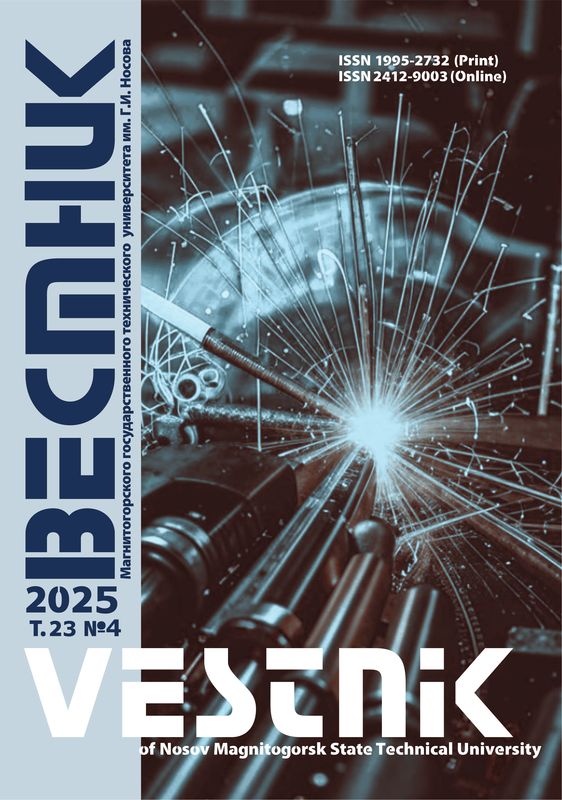DOI: 10.18503/1995-2732-2023-21-2-54-66
Abstract
Reduction of cost and weight, while increasing reliability and safety of currently manufactured steel products, requires metallurgists to seek for alternative solutions, when choosing steelmaking technology meeting the applicable environmental requirements and safety policy. One of the efficient methods for solving this problem is an asymmetric rolling process. The paper presents a physical modeling of a manufacturing process of hot rolled strips, using both symmetric and asymmetric forming on the laboratory reversing two-high rolling mill with individually driven work rolls at the Zhilyaev Laboratory of Mechanics of Gradient Nanomaterials of Nosov Magnitogorsk State Technical University. To change the texture of steel, we applied mismatching velocities of work rolls. The presented results of the optical analysis, EBSD and SEM analysis show that it is possible to form an ultrafine-grained structure of low-carbon steel. It was determined that a carbon-containing phase after hardening in an original state, symmetric rolling with a total reduction of 60%, asymmetric rolling with a total reduction of 50% was bainite, containing areas of a martensite-austenite phase (MA) phase along boundaries, or in areas, 5-10 µm or less in size. The specimens after reversing rolling showed hardened structures (MA-phase and bainite), as well as pearlite areas. Increased total reduction results in a structure refinement; an increase to 80% entails complete recrystallization and transformation of a carbon-containing phase into carbide (cementite) lines along boundaries of ferrite grains. The size of recrystallized grains is 5 µm on average and 8 µm on weighted average.
Keywords
hot rolling, physical modeling, asymmetry, mill, texture, hardening, electrical steel, speed, phases
For citation
Gorbunov K.S., Shcherenkova I.S., Orekhova Yu.N., Mazur I.P. Investigation of the Structure of Low-Carbon Steel after Physical Modeling of an Asymmetric Process During Hot Rolling. Vestnik Magnitogorskogo Gosudarstvennogo Tekhnicheskogo Universiteta im. G.I. Nosova [Vestnik of Nosov Magnitogorsk State Technical University]. 2023, vol. 21, no. 2, pp. 54-66. https://doi.org/10.18503/1995-2732-2023-21-2-54-66
1. Kazadzhan L.B. Magnitnye svoystva elektrotekhnicheskikh staley i splavov [Magnetic properties of electrical steels and alloys]. Moscow: Science and Technology, 2000, 223 p. (In Russ.)
2. Safronov A.A., Belsky S.M., Cherny V.A., Mazur I.P. Modeling of temperature influence on resistance of electrical steels to plastic deformation during hot rolling. Journal of Physics: Conference Series. 2018;1134(1). Article No. 012050. DOI: 10.1088/1742-6596/1134/1/ 012050
3. Puzanov M.P. Issledovanie napryazhenno-deformiro-vannogo sostoyaniya protsessa listovoy prokatki transformatornoy stali s uchetom anizotropii svoystv: dis. …kand. tekhn.nauk [Study on the stress and strain state of the process of sheet rolling of transformer steel factoring into anisotropy of properties: PhD (Eng.) thesis]. Yekaterinburg, 2019. 134 p.
4. Pesin A.M. Salganik V.M. Asimmetrichnaya tonkolistovaya prokatka: razvitie teorii, tekhnologii i novye resheniya: ucheb. posobie dlya vuzov [Asymmetric rolling: development of theory, technology and new solutions: Study guide for universities]. Moscow: Moscow Institute of Steel and Alloys, 1997, 191 p. (In Russ.)
5. Pesin A.M., Pustovoytov D.O., Sverdlik M.K. Razvitie teorii i tekhnologii protsessa asimmetrichnoy tonkolistovoy prokatki kak metoda intensivnoy plasticheskoy deformatsii: monografiya [Development of theory and technology of the asymmetric rolling process as a method of severe plastic deformation: Monograph]. Magnitogorsk: Nosov Magnitogorsk State Technical University, 2017, 151 p. (In Russ.)
6. Pesin A.M., Pustovoytov D.O., Sverdlik M.K. Modeling of temperature fields in the deformation zone during asymmetric rolling of aluminum alloys. Vestnik Magnitogorskogo gosudarstvennogo tekhnicheskogo universiteta im. G.I. Nosova [Vestnik of Nosov Magnitogorsk State Technical University]. 2014;(1):71-78. (In Russ.)
7. Pesin A.M., Pustovoytov D.O., Vafin R.K. Modeling of temperature fields in the deformation region during asymmetric rolling of aluminum alloys. Vestnik Magnitogorskogo gosudarstvennogo tekhnicheskogo universiteta im. G.I. Nosova [Vestnik of Nosov Magnitogorsk State Technical University]. 2015;(4):75-81. (In Russ.)
8. Pustovoytov D.O., Pesin A.M., Lokotunina N.M., Kozhemyakina A.E. Influence of small microscopic grooves of work rolls on the deformation gradient induced in metal sheets during symmetric and asymmetric rolling. 28-ya mezhdunarodnaya konferentsiya po metallurgii i materialovedeniyu “Proizvodstvo metalla” [The 28th International Conference on Metallurgy and Materials Science. Metal Production]. 2019, vol. 1, pp. 265-270. (In Russ.)
9. Olsson K., Sperle J. New advanced ultra-high strength steels for the automotive industry. AutoTechnology. 2006;6(5):46-49.
10. Davies G. Materials for automobile bodies. Oxford: Linacre House, Jordan Hill, 2003, 368 p.
11. Levykina A.G., Soloviev V.N., Mazur I.P. Assessment of the possibility of producing hot rolled strips from dual-phase steel on the existing discharge rolling table of the hot strip mill. Chernye metally [Ferrous Metals]. 2020;(8):10-14. (In Russ.)
12. Levykina A.G., Chabanenko A.A., Shkatov V.V., Mazur I.P. The study on the thermal state of steel in the production of hot rolled strips in Deform 3D. IOP Conf. Journal of Physics: Conference Series. 2018;1134(1). Article No. 012034.












